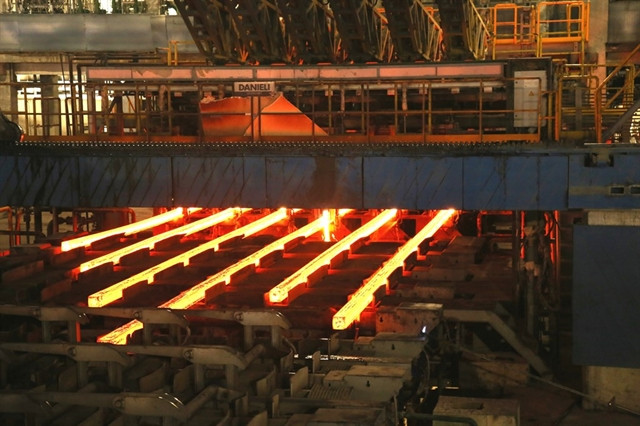 A Hoa Phat steel factory. About 90% of domestic steel output ends up in construction sites whereas just 10% goes to other industries. Photo courtesy of the firm
A Hoa Phat steel factory. About 90% of domestic steel output ends up in construction sites whereas just 10% goes to other industries. Photo courtesy of the firmPhamTuan Anh, Deputy Director General of the Industry Agency, Ministry of Industryand Trade (MoIT), attributed the technological inferiority todomestic firms' limited resources and an inadequate labour force.
Hesaid the manufacturing sector has been developing asymmetrically with anover-dependence on FDI firms. The economic over-representation of thefirms can be observed visibly in the heavy industrial subsector.
Thesector's reliance on imported materials compounds the situation, resulting inlow value-added domestic products. Industrial transition over the past fewyears, undoubtedly, has been fueled largely by FDI firms rather thandomestic ones.
The officialcalled for favourable policies to keep firms well-informed about advancedtechnologies and facilitate the emergence of big firms, which act asa catalyst for an industrial leap forward.
Healso said not only should the manufacturing sector be heavily invested but soshould supporting industries, which supply the former with fuels, componentsand materials.
"Weneed favourable policies to help domestic industries, notably includingtextile, footwear and fishery, maintain their low-cost advantages and take thelead in the technological race," he added.
NguyenHuu Tu, member of the Vietnam Chemical Corporation's Board of Directors, revealedthat the chemical industry is up to domestic demand in terms of basic products,but it is not the case for high-tech ones.
Hetook technical rubber as an example, which domestic firms have a limitedcapability for mass-production. Imported rubber, accordingly, have to comein to fill the demand gap.
Tucalled for Governmental Decision 726 to be implemented to accelerate thegrowth of the chemical industry. He also suggested a revision to taxpolicies to level the playing field for both domestic and imported fertilisers.
Lastly,he called for favourable policies on land rental in industrial parks andpreferential loans for chemical producers to improve their competitivepositions.
DinhQuoc Thai, Secretary General of the Vietnam Steel Association, revealed thatthe steel industry produces up to 30 million tonnes of steel per year. However, 90%of the steel caters for building works, whereas just 10% goes to otherindustries.
Thedisproportion can be attributed to the fact that some industries cannot findcertain types of domestically-made high-quality steel. They have to relyon imported steel to feed their production.
Thesecretary general urged MoIT to draw up the Strategy for the Developmentof the Steel Industry until 2030 with a vision to 2050, which is expected tonurture the sustainable growth of domestic steel.
Healso called for favourable policies to boost steel-consuming industries such ascar component making, thereby raising the demand for the domestically-producedmetal./.




























